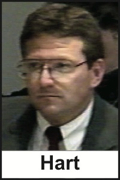Rascals case in brief
In the beginning, in 1989, more than 90 children at the Little Rascals Day Care Center in Edenton, North Carolina, accused a total of 20 adults with 429 instances of sexual abuse over a three-year period. It may have all begun with one parent’s complaint about punishment given her child.
Among the alleged perpetrators: the sheriff and mayor. But prosecutors would charge only Robin Byrum, Darlene Harris, Elizabeth “Betsy” Kelly, Robert “Bob” Kelly, Willard Scott Privott, Shelley Stone and Dawn Wilson – the Edenton 7.
Along with sodomy and beatings, allegations included a baby killed with a handgun, a child being hung upside down from a tree and being set on fire and countless other fantastic incidents involving spaceships, hot air balloons, pirate ships and trained sharks.
By the time prosecutors dropped the last charges in 1997, Little Rascals had become North Carolina’s longest and most costly criminal trial. Prosecutors kept defendants jailed in hopes at least one would turn against their supposed co-conspirators. Remarkably, none did. Another shameful record: Five defendants had to wait longer to face their accusers in court than anyone else in North Carolina history.
Between 1991 and 1997, Ofra Bikel produced three extraordinary episodes on the Little Rascals case for the PBS series “Frontline.” Although “Innocence Lost” did not deter prosecutors, it exposed their tactics and fostered nationwide skepticism and dismay.
With each passing year, the absurdity of the Little Rascals charges has become more obvious. But no admission of error has ever come from prosecutors, police, interviewers or parents. This site is devoted to the issues raised by this case.
On Facebook
Click for earlier Facebook posts archived on this site
Click to go to
Today’s random selection from the Little Rascals Day Care archives….
Click for earlier Facebook posts archived on this site
Click to go to
Today’s random selection from the Little Rascals Day Care archives….
High school students introduced to ‘Innocence Lost’

pastdaily.com
Edward R. Murrow
June 10, 2016
It’s heartening to see that, 25 years later, “Innocence Lost” is still shining light on the wrongful prosecution of the Edenton Seven – and for a younger audience! This is a note from Judy Griffin, a teacher at Hamilton High School in Michigan, who recently rediscovered Ofra Bikel’s eight-hour masterpiece:
“I want you to know how helpful it is (to have “Innocence Lost” available online). I teach in a resource room English class. The kids have no cognitive issues, but reading is a tremendous struggle. When they can receive the information through really good videos like this one, we can cover some great information.
“We start by reading Edward R. Murrow’s introduction to ‘This I Believe.’ Then the students create digital versions of their own. After that, they view ‘Good Night, and Good Luck.’ They have just learned about McCarthyism at this point in U.S. History, so it is fresh in their minds.
“We move then into The Crucible. The students are then asked to compare this to ‘Good Night, and Good Luck.’ They read ‘Why I wrote The Crucible’ by Arthur Miller.
“At the conclusion, we talk about how these hysterias are repeated and actually happened even prior to Salem. I introduce the Day Care scandal, and was thrilled to find the original ‘Frontline’ episodes. I had seen it when it aired!
“They are now researching various aspects of the hysteria. Some are looking at ‘satanic ritual abuse,’ some are looking at how hysteria spreads, some are researching what happened to the various defendants, and some are looking at the causes. We emphasize that this is not unique to any of these situations, and the point of this all is to show how vulnerable societies are to hysteria….”
![]()
Bill Hart played by his own (poker) rules
 June 8, 2012
June 8, 2012
“The duty of the prosecutor is to seek justice, not merely to convict.”
– American Bar Association
“The primary responsibility of prosecution is to see that justice is accomplished.”
– National District Attorneys Association
“If you were playing poker, would you be playing with your full hand
showing?”
– Bill Hart, special deputy attorney general, defending his unwillingness
to share evidence with the Little Rascals defense
Skeptics not welcome where ‘awareness’ rules
Dec. 19, 2012
“Down with skepticism, up with awareness.”
– Button worn at a conference on “multiple personality disorder” (hat tip, religioustolerance.org)
Six words that say it all, from MPD to satanic ritual abuse to recovered memory therapy.
There’s plenty to be said for “awareness,” of course – just not as a euphemism for “gullibility.”
A lack of reporters ‘sufficiently passionate to get at this story’?

thetennessean.com
Frank Daniels III
July 8, 2016
“As for an ‘investigative’ piece about the Kelly case that would get to the ‘truth,’ we will have to see if we have any staff members who are sufficiently passionate to get at this story….”
– From News & Observer executive editor Frank Daniels III’s reply (June 10, 1992) to a plea for coverage from Jane W. Duffield of the Committee to Support the Edenton Seven
Daniels’ predecessor, Claude Sitton, lamented later that “my greatest mistake (was) my failure as editor… to make sure we had a top-notch investigative reporter on the Little Rascals case.”
I’ve asked Daniels to share his own recollections of the paper’s coverage, but haven’t heard back.
![]()











0 CommentsComment on Facebook